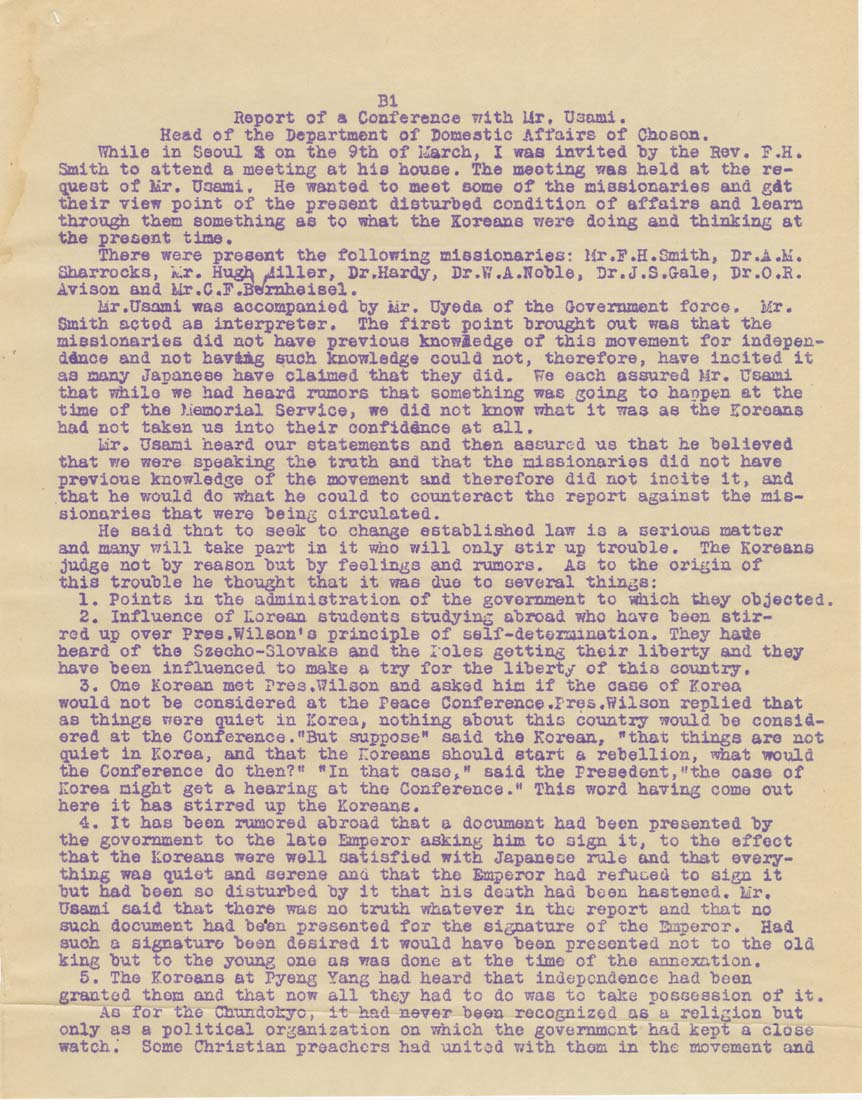Bl
Hoport of a Conference -with llr, Usaxoi.
Head of the Department of Bomeatic Affairs of Cb,oson.
While in Seoul i on the 9th of liarch, I waa invited by the Hev, F,H.
Smith to attend a meeting at his house. The meoting was held at the re-
tjfiBQt of Mr. TJoaml. He wanted to meet acme of the missionaries and gdit
their view point of the present disturbed condition of affairs and learn
through them something as to what the Koreans were doing and thinking at
the present tixae.
There were present the following missionaries: Hr.F.H.Smith, Dr.A.M.
Sharrocks, kr. Hugh Jiller, Dr.Hardy, Dr.W.A.Hoble, Dr.J.S.Sale, Br.O.E.
Avison and Ur.C.F.Boxziheisel.
Mr.Usami was accompanied hy Mr. Uyeda of the Government force. Mr.
Smith acted as interpreter. The first point hrought out was that the
missionaries did not have previous knowledge of this movement for indepen-
d<bice and not havft&g suoh knowledge could not, therefore, have incited it
as many Japanese have claimed that they did. We each assured Mr. Usami
•that lAile we had heard rumors that something was going to happen at the
time of the Memorial Service, we did not know TAiat it 'was ae the £:oroans
had not taken us into their oonfiddnce at all.
Iir, Usami heard our statements and then aseurcd us that he believed
that ?/e were speaking the truth and that the missionaries did not have
previous knowledge of the movement and therefore did not incite it, and
that he would do what he could to counteract the report against the mis¬
sionaries that were being circulated.
He said that to seek to change established law is a serious matter
amd many will take part in it who will only stir up trouble. The Koreans
judge not by reason but by feelings and rumors. As to the origin of
•this trouble he thought that it was due to several things:
1. Points in the administration of the government to ii^ich they ob;jected.
2. Influence of Lorean students studying abroad who have been stir¬
red up over Pres.Wilson's principle of self-detorsiination. They hade
heard of the Szecho-Slovake and the loles getting their liberty and they
have been influenced to make a try for "the liberty of thia country,
5. One Korean met Prea.Wilson and askod hin if the case of Korea
would not be considered at the Peace Conference .Ires .Wilson replied -that
as things wore quiet in Korea, nothing about this country would be consid¬
ered at the Conference."But suppose" said -the Korean, "that things are not
quiet in Korea, and that the IToreans should start a rebellion, vdaat would
the Conference do then?" "In that case," said the Presedent,"the case of
Korea might get a hearing at tho Conference." This word having come out
here it has stirred up the Koreans.
4. It has been rumored abroad that a doctiment had been presented by
the government to the late Emperor asking him to sign it, to the effect
that the ILoreans were well satisfied with Japanece rule and that every¬
thing was quiet and serene ana that the Emperor had refuced to sign it
but had been so disturbed by it that his dea-th had been hastened. Mr,
Usami said "that •there was no tru'th whatever in tht report and that no
such document had be'en presented for the signature of the Emperor. Had
suoh a signature been desired it wo\ild have been presented not to the old
king but to the young one as waa done at the time of the annexation.
5. The Koreans at Pyeng Yang had heard that independence had been
granted thom and that now all they had to do was to take possession of it.
As for the Chundokyo, it had never been recognized as a religion but
only as a political organization on which the government had kept a close
watch.' Some Christian preachers had unitsd with thom in the movement and
|








